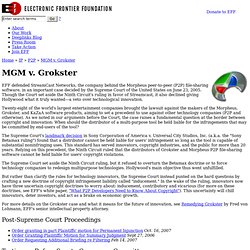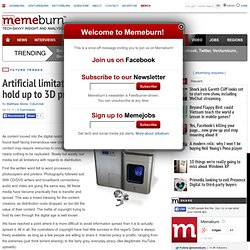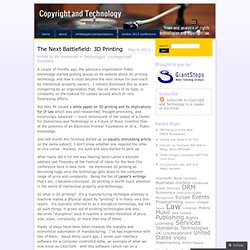

MGM v. Grokster. EFF defended StreamCast Networks, the company behind the Morpheus peer-to-peer (P2P) file-sharing software, in an important case decided by the Supreme Court of the United States on June 23, 2005.

Though the Court set aside the Ninth Circuit's ruling in favor of Streamcast, it also declined giving Hollywood what it truly wanted—a veto over technological innovation. Twenty-eight of the world's largest entertainment companies brought the lawsuit against the makers of the Morpheus, Grokster, and KaZaA software products, aiming to set a precedent to use against other technology companies (P2P and otherwise).
As we noted in our arguments before the Court, the case raises a fundamental question at the border between copyright and innovation: When should the distributor of a multi-purpose tool be held liable for the infringements that may be committed by end-users of the tool? The Supreme Court's landmark decision in Sony Corporation of America v. Universal City Studios, Inc. MGM v. Artificial limitations: How will copyright hold up to 3D printing? As content moved into the digital realm, copyright found itself facing tremendous new challenges.

Digital content may require resources to create, but it requires nearly nothing to be replicated. Slowly but surely, our media lost all limitations with regards to distribution. First the written word fell to word processors, photocopiers and printers. Photography followed suit. With CD/DVD writers and broadband connections, audio and video are going the same way. We have reached a point where it is more difficult to avoid information spread than it is to actually spread it. There is a fair amount of debate as to whether or not current copyright application is becoming outdated. As increasingly large amounts of data are transferred between people all over the world, it is becoming more and more difficult to lay claim to exclusive rights over specific content.
The objects created with these printers are impressive. Copyright Laws Now Working to Destroy 3D Printer Industry: Paramount Files Cease and Desist Against 3D Printer 'Pirate' By Enigmax, TorrentFreak Movie studio Paramount are adept at sending out cease and desist notices, having engaged in the activity for many years.

However, while the vast majority are related to solely digital activities such as the unauthorized distribution of movies and TV shows, a recent takedown notice has a very interesting ‘real-world’ twist – the recreation of a physical object from digital data. [...] On June 8th Blatt announced on theRPF.com movie prop fansite that he was recreating the distinctive cube-shaped items from the Stephen Spielberg movie ‘Super 8‘. On June 9th he uploaded the files to Shapeways. By June 10th, Blatt had received unwelcome contact from Hollywood lawyers and all his posts on theRPF were quickly edited out. The Next Battlefield: 3D Printing « Copyright and Technology. Posted by Bill Rosenblatt in Technologies, Uncategorized.

Trackback A couple of months ago, the advocacy organization Public Knowledge started posting pieces on its website about 3D printing technology and how it could become the next venue for overreach by intellectual property owners. I initially dismissed this as scare-mongering by an organization that, like all others of its type, is constantly on the lookout for causes around which to rally fundraising efforts. But then PK issued a white paper on 3D printing and its implications for IP law which was well-researched, thought-provoking, and surprisingly balanced — more reminiscent of the output of a Center for Democracy and Technology or a Future of Music Coalition than of the polemics of an Electronic Frontier Foundation or of a… Public Knowledge.
And last month Ars Technica dished up an equally stimulating article on the same subject; I don’t know whether one inspired the other or vice versa. The next Napster? Copyright questions as 3D printing comes of age. The Penrose Triangle is as elegant as it is impossible—much like M.C.

Escher’s drawings, it presents a two-dimensional illusion that the eye interprets as three-dimensional. The task of effectively creating this illusion in three dimensions, without resorting to hidden openings or gimmicky twists, seemed daunting until a Netherlands-based designer named Ulrich Schwanitz succeeded in printing the object recently. But Schwanitz, who posted a YouTube video of his design achievement in action, wouldn’t share his secret with the world. Instead, he made his “impossible triangle” available for purchase through Shapeways, a company that fabricates custom 3D designs, for $70. 3D Printing May Face Legal Challenges. 3D Printing Expands How You Should Think About Copyright: The Super 8 Cube Edition. If you pay attention to intellectual property (IP) issues on the internet, there is probably one concept that is on your mind more than any other: “fair use.”

3D printing - A new copyright challenge? A retail revolution? You’re all aware of what happened to the music and film industries.

The internet made is easy to copy and share entertainment - and so people did just that. In fact, you could argue that the internet made it desirable to copy and share entertainment. The gaming business as had it easier because many modern games are at the best once you’ve connected to a central hub and are playing with friends – and the game publishers retain control of those hubs and authorise only valid games. What if this "easy to copy and share" revolution stretched outside of music and films? What if it came to actual physical goods? It Will Be Awesome if They Don't Screw it Up: 3D Printing...